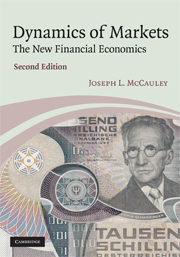Book contents
- Frontmatter
- Contents
- Preface to the second edition
- 1 Econophysics: why and what
- 2 Neo-classical economic theory
- 3 Probability and stochastic processes
- 4 Introduction to financial economics
- 5 Introduction to portfolio selection theory
- 6 Scaling, pair correlations, and conditional densities
- 7 Statistical ensembles: deducing dynamics from time series
- 8 Martingale option pricing
- 9 FX market globalization: evolution of the Dollar to worldwide reserve currency
- 10 Macroeconomics and econometrics: regression models vs empirically based modeling
- 11 Complexity
- References
- Index
6 - Scaling, pair correlations, and conditional densities
Published online by Cambridge University Press: 02 December 2010
- Frontmatter
- Contents
- Preface to the second edition
- 1 Econophysics: why and what
- 2 Neo-classical economic theory
- 3 Probability and stochastic processes
- 4 Introduction to financial economics
- 5 Introduction to portfolio selection theory
- 6 Scaling, pair correlations, and conditional densities
- 7 Statistical ensembles: deducing dynamics from time series
- 8 Martingale option pricing
- 9 FX market globalization: evolution of the Dollar to worldwide reserve currency
- 10 Macroeconomics and econometrics: regression models vs empirically based modeling
- 11 Complexity
- References
- Index
Summary
We've covered the basic required math in Chapter 3, and have introduced the reader to the most basic ideas of financial markets in Chapter 4. Scaling is widely assumed in econophysics; the questions for us are simple: (i) what does scaling imply, and (ii) does it really occur (Chapter 7)? In this chapter we explicitly construct scaling models where one class violates the EMH and the other class satisfies it. We also determine whether scaling, when it occurs, is reflected in transition densities and pair correlations.
Hurst exponent scaling
We now begin to discuss two completely unrelated topics that are often confused together in the literature: scaling and long time correlations. Scaling with a Hurst exponent H ≠ 1/2 is often misinterpreted as implying the long time autocorrelations of fractional Brownian motion (fBm). We'll show that scaling has nothing to do with long time correlations: when scaling occurs, then it's restricted to one-point densities and one-point densities tell us nothing about correlations. We'll show in the end that transition densities and pair correlations generally cannot scale even if certain random trajectories do scale. In other words, and in contrast with the statistical physics of order-disorder transitions, scaling does not reflect dynamics at all!
Information
- Type
- Chapter
- Information
- Dynamics of MarketsThe New Financial Economics, pp. 133 - 147Publisher: Cambridge University PressPrint publication year: 2009
